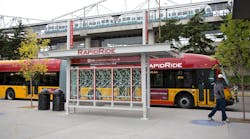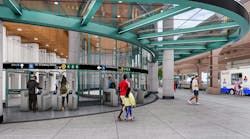OP-ED: How to understand how your transit agency spends FTA funding in 2024
In 2024, the Federal Transit Administration (FTA) will make $20.5 billion in funding available under various formula and national competitive discretionary grant programs. This does not include several hundred million in Federal Highway Administration Congestion Mitigation and Air Quality, Surface Transportation Block Grant, Flexible Funding for Transit Access and Tribal Transportation Program funding, which can be transferred to FTA for financing transit projects.
There are more than 550 transit agencies in more than 400 urbanized areas, more than 1,200 transit agencies in non urbanized rural communities and more than 3,600 agencies providing services to the elderly and those citizens with disabilities that are eligible to receive funding. This is accomplished under the FTA Transit Award Management System (TrAMS) used to award and manage federal grants.
The FTA averages $1.8 billion in capital grants to the New York Metropolitan Transportation Authority (MTA) annually. As part of requirements contained within all master grant agreements, using the FTA TrAMS, the MTA provides updated quarterly financial and milestone progress reports to the FTA on active capital improvement projects and programs. These are usually submitted within 30 days after the fiscal quarter has started on the first of the month and ends last day of the third month. Federal fiscal quarters are October - December, January - March, April - June and July - September.
Does the MTA submit grant applications on time for both formula and discretionary competitive funding opportunities? Do they take advantage of pre-award authority prior to grant approval?
Use of pre-award authority affords the opportunity to incur costs for reimbursement at a later date after grant obligation of funding. This allows the MTA to initiate work, including advertising, awarding of contracts and issuing notice to proceed for contractors to begin work prior to grant award. Activities performed by force account or in-house staff can also begin work prior to grant award.
Have all MTA FTA grant funded capital project contracts been awarded? Are current federal transit projects and programs progressing on schedule, completed on time and within budget?
Explanations for project delays and any change orders more than $100,000 are required. Project delays require recovery schedules and revised interim milestones.
Are funds being expended on a timely basis? Are there any unspent funds carried over year after year? Are there any formula or national discretionary competitive grant allocations carried over from previous federal fiscal years the MTA has failed to initiate or complete the grant application process?
Are there open grants with no recent financial activity? Are there older grants with small balances and no recent financial activity? Is the agency local share still in place for all grants after FTA obligation of federal funds?
Due to ongoing litigation against implementation of congestion pricing, the MTA earlier this year delayed advertising and awarding additional contracts as part of the $7.7 billion ($3.4 billion FTA share / $4.3 billion MTA local share) Second Avenue Subway Phase 2 FTA Capital Investment Grant New Starts Full Funding Grant Agreement. This includes a legal commitment that the $4.3 billion in local share was real, secure and in place.
FTA funding of $3.4 billion was approved based upon the MTA's legal commitment of a secure $4.3 billion local share. MTA's source of local share was based upon implementation of congestion pricing. Pending successful resolution of legal litigation, the MTA plans on starting congestion pricing by July 1, 2024. Is there any waste, fraud or abuse? Are all change orders for construction and capital asses purchase projects fair, reasonable and documented?
Does the MTA seek federal reimbursement as appropriate on a regular basis? Are New York Gov. Kathy Hochul, New York City Mayor Eric Adams, the MTA Board, MTA operating agency presidents, chief engineers and others aware of all this information? Do they read these reports? If not, are they briefed on a regular basis by their respective staff on the contents of these reports?
Both the MTA and FTA have independent engineering consultant firms to supplement in house staff for oversight. These companies provide both oversight and technical assistance for capital projects. FTA usually assigned their own engineering consultant firms to those projects worth $100 million or more. Engineering firms monitor the progress of major capital projects and prepare monthly progress reports.
The FTA also has other consulting firms who conduct periodic Financial Management, Procurement System and Triennial (to insure compliance with FTA rules and regulations) along with various Civil Rights (including either Title VI, Disadvantaged Business Enterprise, Equal Opportunity Employment, Americans With Disabilities, Rail Station, Fixed Bus Route and Paratransit reviews). These reviews may cover either MTA HQ and/or various MTA operating and construction agencies, including New York City Transit, Long Island Rail Road, Metro North Rail Road, MTA Capital Construction and MTA Bus.
The reports are made available to most of those on distribution lists for MTA and FTA independent engineering oversight consulting firms reports. Citizens can access some of these documents by going to the FTA website.
Both NYC Mayor Adams and Gov. Hochul proudly boast how they manage the most transparent administrations in history. How much of the information submitted to FTA do they require the MTA to post on their website?.
New York State Comptroller Tom Di Napoli, NYC Comptroller Brad Lander, NYC Office of Management and Budget and NYC Independent Budget Office all perform periodic audits of MTA projects and programs. The United States Department of Transportation Office of Inspector General (OIG), New York State OIG, NYC OIG and MTA OIG all perform periodic audits of MTA and operating agency projects and programs.
City, state and federal financial assistance along with farebox revenues fund MTA capital projects and programs. Transit riders and taxpayers are looking for accountability, efficient and timely completion of capital projects, programs and maintenance of all physical assets to assure consistent reliable and safe commutes at a reasonable price.

Larry Penner
Larry Penner is a transportation advocate, historian and writer who previously served as a former director for the Federal Transit Administration Region 2 New York Office of Operations and Program Management. This included the development, review, approval and oversight for billions in capital projects and programs for New Jersey Transit, New York Metropolitan Transportation Authority, NYC Transit bus, subway and Staten Island Railway, Long Island and Metro North railroads, MTA Bus, NYCDOT Staten Island Ferry along with 30 other transit agencies in New York and New Jersey.






